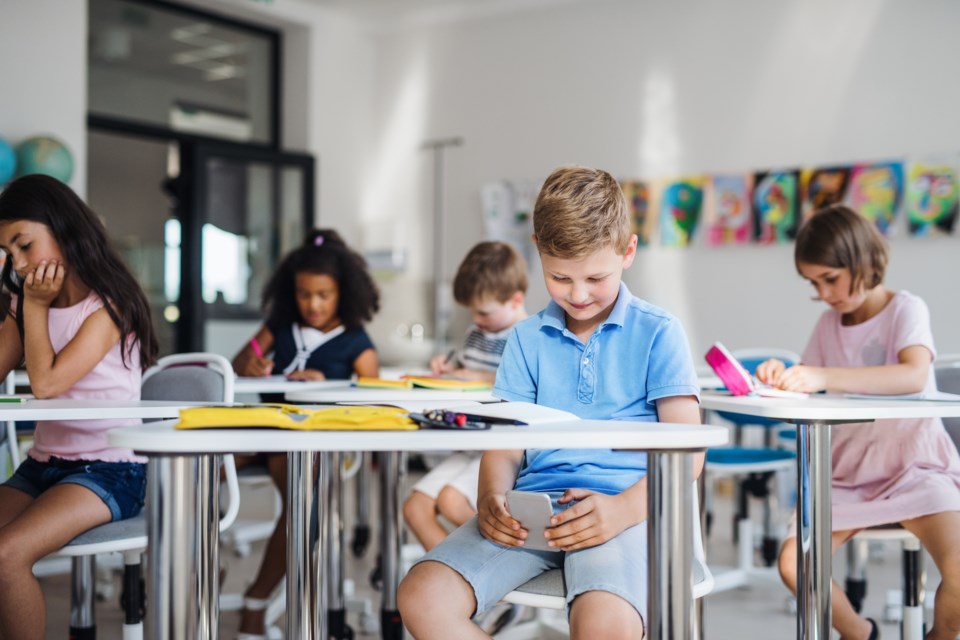Should smartphones be allowed in classrooms?
While your kneejerk reaction might be to say no, there is some nuance to this issue.
Earlier this month, the BC United party announced that, if elected, they would ban cellphones in K-12 classrooms, saying “mobile phone usage is negatively impacting our kids’ educations,” citing recent Program for International Student Assessment (PISA) scores. Those scores, based on testing in 2022, found that average performance of Canadian students was lower in 2022 than in any previous assessment, but still higher than the average for other states belonging to the Organization for Economic Cooperation and Development (OECD) states.
Quebec banned cellphones in classrooms as of December 31, 2023.
The use of smartphones in class can disrupt learning and distract students, says a recent report from the United Nations Educational, Scientific and Cultural Organization (UNESCO).
“Even just having a mobile phone nearby with notifications coming through is enough to result in students losing their attention from the task at hand,” the report says. “One study found that it can take students up to 20 minutes to refocus on what they were learning once distracted.”
Removing smartphones from classrooms has improved learning outcomes in certain countries, the report found. Smartphones should be used in classrooms only when they clearly support learning, UNESCO concludes.
But a complete ban may not be the solution.
I put out a request for teacher comment on X, the social media platform formerly known as Twitter, last weekend. No one recommended an outright ban, for reasons ranging from kids using smartphones to monitor their health to phones being used to enhance learning when there aren’t enough computers to go around. Several parents of neurodivergent children replied that their kids use their phones to communicate or otherwise support their learning.
Many respondents agreed that smartphones do distract children (I know they distract me!) but stressed the more important issue is teaching children to self-regulate – to know the appropriate uses for their phones and how and when to use them.
Schools have always played a role in teaching children how to get along with others and how to survive and thrive as part of a bigger society. This discussion about phones may also come down to that.
I caught a snippet from a Christiane Amanpour interview with NYU marketing professor Scott Galloway this weekend in which he said loneliness was the biggest threat from artificial intelligence and that deep and meaningful relationships are the most rewarding things in life.
Smartphones might enhance our online relationships, but they most definitely take away from our in-person connections, not to mention complications like cyberbullying that add to anxiety in young people. Knowing how and when to use phones, and how and when not to, will help young folks develop friendships and other social bonds, which is a crucial skill for survival.
Several of the people who responded to my request for comments suggested a nuanced ban, one that made it possible for teachers to say “no phones,” but that also allowed teachers to use their own discretion as to when phones should be allowed in the classroom, might be helpful.
Teachers need to be able to enforce times when phones must be put away, with exceptions for medical reasons, of course.
One teacher said she would have loved a ban in 2010 when smartphones were becoming a problem, but said phones are now so embedded in life, a ban would be tough to enforce. Another said she has a “charge-up rest stop” for phones that are being used inappropriately. One grandmother said her grandson’s school has cellphone breaks every couple of hours because students are going to use their phones anyway.
In the real world, we have our phones. In the real world, our phones distract us and take us away from both productive work and from forming and maintaining those important personal relationships that make life worth living.
I don’t support a smartphone ban in schools, nor do I think it’s realistic. What I do support is teaching kids the life skills they’re going to need to live happy and productive lives when they leave school. That means learning when it’s appropriate to use a phone and when it is not. It means being able to put the phone down and interact with other people when it’s appropriate to do so.
If teachers need support and tools to be able to teach those skills, including the ability to enforce a “no phones” zone or times or whatever it is, they should be given that. But a blanket ban doesn’t make sense.
Tracy Sherlock is a freelance journalist who writes about education and social issues. Read her blog or email her [email protected].



